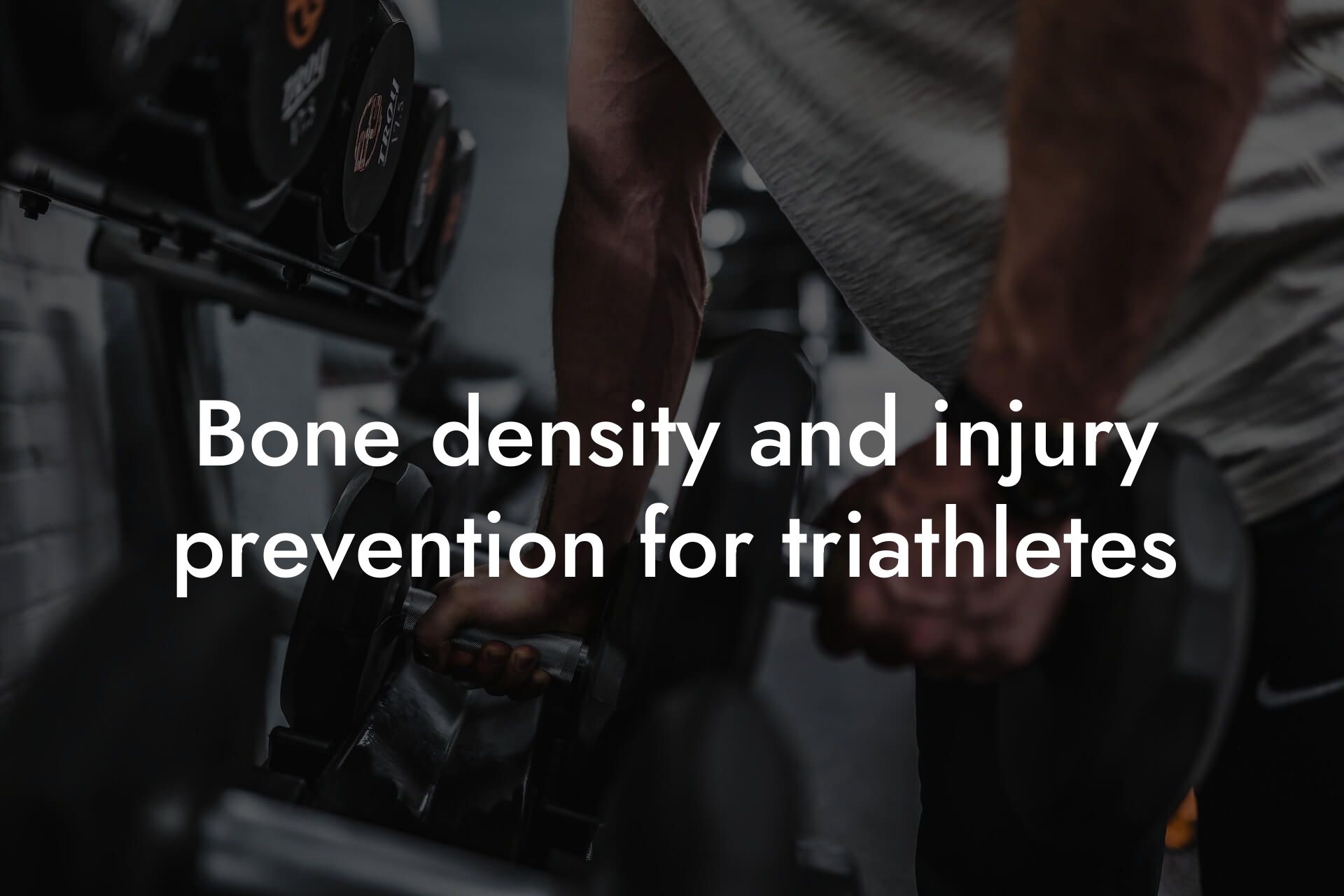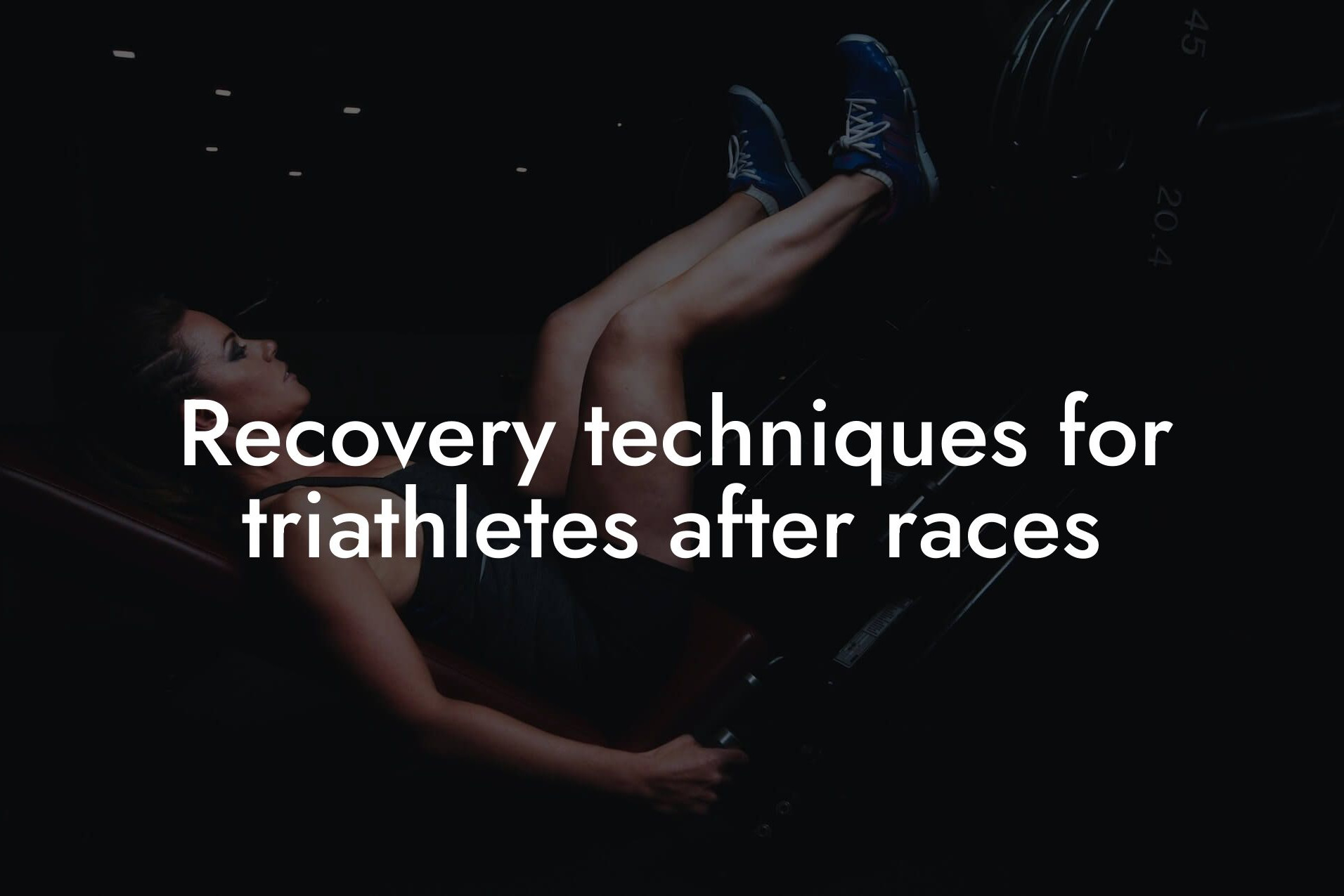As a triathlete, you understand the importance of optimizing your performance to achieve success in this demanding sport. While many factors contribute to your overall performance, body composition plays a critical role in determining your speed, endurance, and overall triathlon success. In this article, we'll delve into the importance of body composition in triathlon performance, and how understanding your body composition can help you take your training to the next level.
Table of Contents
- What is Body Composition?
- Why is Body Composition Important for Triathletes?
- The Impact of Body Composition on Triathlon Performance
- How to Measure Body Composition
- Optimizing Body Composition for Triathlon Performance
- Take the First Step Towards Optimizing Your Body Composition
- Frequently Asked Questions
What is Body Composition?
Body composition refers to the proportion of fat and lean mass in your body. Lean mass includes muscle, bone, and other non-fat tissues, while fat mass includes both essential and storage fat. A healthy body composition is essential for optimal athletic performance, as it directly impacts your power-to-weight ratio, endurance, and overall physical function.
Why is Body Composition Important for Triathletes?
For triathletes, body composition is crucial because it affects your performance in all three disciplines: swimming, cycling, and running. Excess body fat can hinder your performance by increasing your energy expenditure, reducing your power output, and slowing you down. On the other hand, having too little body fat can also be detrimental, as it can lead to decreased muscle mass and reduced endurance.
Optimal body composition for triathletes typically falls within a specific range. For men, this range is typically between 6-13% body fat, while for women, it's between 16-23% body fat. However, these are general guidelines, and individual optimal body composition can vary depending on factors such as age, sex, and training experience.
The Impact of Body Composition on Triathlon Performance
Body composition has a significant impact on triathlon performance, affecting various aspects of your training and racing. Here are some ways in which body composition influences your performance:
- Power-to-Weight Ratio: Excess body fat reduces your power-to-weight ratio, making it more challenging to generate power and speed. A higher lean mass percentage, on the other hand, enables you to produce more power relative to your body weight.
- Endurance: A higher percentage of body fat can reduce your endurance, as your body needs to work harder to transport excess weight. This can lead to fatigue and decreased performance over longer distances.
- Thermoregulation: Excess body fat can impede heat dissipation, leading to increased core temperature and decreased performance in hot environments.
- Injury Risk: Poor body composition can increase your risk of injury, particularly in the lower extremities, due to excessive impact and stress on your joints.
How to Measure Body Composition
Accurate measurement of body composition is essential for understanding your current body composition and tracking changes over time. There are several methods to measure body composition, including:
- Dual-Energy X-ray Absorptiometry (DEXA): A non-invasive, highly accurate method that uses X-rays to measure bone density and body composition.
- Hydrostatic Weighing: A method that measures body density by weighing you underwater.
- Skinfold Measurements: A method that measures body fat by pinching the skin at specific points.
- Bioelectrical Impedance Analysis (BIA): A non-invasive method that uses a small device to measure electrical resistance in your body.
At Tano Performance Group, we use DEXA scans to provide our clients with a comprehensive body composition analysis. This advanced technology provides detailed information on body fat percentage, lean mass, bone density, and more, helping you optimize your training and nutrition for improved performance.
Optimizing Body Composition for Triathlon Performance
To optimize your body composition for triathlon performance, focus on the following strategies:
- Periodized Nutrition: Tailor your nutrition plan to your training phases, ensuring you're fueling your body for optimal performance.
- Strength Training: Incorporate strength training exercises to build lean mass and improve your power-to-weight ratio.
- Cardiovascular Training: Engage in regular cardiovascular training to improve your endurance and burn excess body fat.
- Rest and Recovery: Prioritize rest and recovery to allow your body to adapt to the demands of training and optimize your body composition.
- Body Composition Analysis: Regularly assess your body composition to track changes and make data-driven decisions about your training and nutrition.
In conclusion, body composition plays a critical role in triathlon performance. By understanding your body composition and optimizing it for your specific needs, you can improve your power-to-weight ratio, endurance, and overall performance. At Tano Performance Group, we're committed to helping high-earning professionals like you achieve their physical goals and take their business to the next level. By leveraging our expertise and advanced technology, you can unlock your full potential and dominate the triathlon scene.
Take the First Step Towards Optimizing Your Body Composition
Ready to take your triathlon performance to the next level? Contact us at Tano Performance Group to schedule a DEXA scan and receive a comprehensive body composition analysis. Our team of experts will work with you to develop a personalized training and nutrition plan tailored to your specific needs and goals. Don't let poor body composition hold you back – take the first step towards optimal performance today.
Frequently Asked Questions
What is body composition, and why is it important for triathletes?
Body composition refers to the percentage of fat, lean mass, and bone density in the body. For triathletes, body composition is crucial because it directly affects their performance. A high percentage of body fat can hinder speed, endurance, and overall athletic ability, while a high percentage of lean mass can improve power, strength, and recovery.
How does body fat percentage affect triathlon performance?
Excess body fat can increase energy expenditure, reduce speed, and decrease endurance. Even a small amount of excess body fat can negatively impact a triathlete's performance, especially in longer distances. On the other hand, a low body fat percentage can improve aerodynamics, reduce energy expenditure, and enhance overall performance.
What is the ideal body fat percentage for triathletes?
The ideal body fat percentage for triathletes varies depending on the individual, their goals, and the distance they're competing in. Generally, male triathletes aim for a body fat percentage between 6-12%, while female triathletes aim for 16-23%. However, these are general guidelines, and the ideal body fat percentage can vary depending on individual factors.
How does lean mass affect triathlon performance?
Lean mass, which includes muscle mass, bone density, and water, plays a crucial role in triathlon performance. A high percentage of lean mass can improve power, strength, and endurance, allowing triathletes to perform at a higher intensity and recover faster. Adequate lean mass also helps to maintain bone density, reducing the risk of injuries and fractures.
What is the relationship between body composition and power output?
There is a strong correlation between body composition and power output. Triathletes with a higher percentage of lean mass tend to have a higher power output, which is essential for sprinting, climbing, and maintaining speed. On the other hand, excess body fat can reduce power output, making it more challenging to achieve high speeds.
How does body composition affect endurance?
Body composition has a significant impact on endurance. Triathletes with a high percentage of body fat tend to fatigue faster, as their bodies need to work harder to carry excess weight. In contrast, triathletes with a high percentage of lean mass tend to have better endurance, as their bodies are more efficient at using energy stores.
What is the impact of body composition on recovery?
Body composition plays a crucial role in recovery. Triathletes with a high percentage of lean mass tend to recover faster, as their bodies are more efficient at repairing and rebuilding muscle tissue. In contrast, triathletes with a high percentage of body fat tend to take longer to recover, as their bodies need to work harder to repair and rebuild muscle tissue.
How can triathletes measure their body composition?
There are several ways to measure body composition, including dual-energy X-ray absorptiometry (DXA), skinfold measurements, bioelectrical impedance analysis (BIA), and hydrostatic weighing. Each method has its own advantages and disadvantages, and triathletes should consult with a qualified professional to determine the best method for their needs.
What is the role of nutrition in body composition for triathletes?
Nutrition plays a critical role in body composition for triathletes. A well-balanced diet that is high in protein, moderate in carbohydrates, and low in fat can help triathletes maintain or achieve their ideal body composition. Additionally, proper hydration and electrolyte balance are essential for optimal performance.
How does training affect body composition for triathletes?
Training has a significant impact on body composition for triathletes. A well-structured training program that includes a mix of endurance, strength, and high-intensity interval training can help triathletes improve their body composition. Additionally, incorporating strength training can help triathletes build lean mass, which is essential for optimal performance.
Can body composition be changed through training and nutrition?
Yes, body composition can be changed through training and nutrition. With a well-structured training program and a balanced diet, triathletes can lose body fat, gain lean mass, and improve their overall body composition. However, it's essential to make sustainable lifestyle changes, rather than trying fad diets or quick fixes.
How long does it take to see changes in body composition?
The time it takes to see changes in body composition varies depending on individual factors, such as starting point, training program, and nutrition plan. Generally, triathletes can expect to see changes in body composition within 6-12 weeks, but it may take longer to achieve significant changes.
What are the risks of extreme body composition changes?
Extreme body composition changes, such as rapid weight loss or gain, can have negative consequences for triathletes. These changes can lead to decreased performance, increased risk of injury, and negative impacts on overall health. It's essential for triathletes to make sustainable lifestyle changes, rather than trying to make drastic changes.
How can triathletes maintain their ideal body composition?
Maintaining ideal body composition requires a long-term commitment to a healthy lifestyle. Triathletes should focus on making sustainable changes to their training program and nutrition plan, rather than trying to make drastic changes. Additionally, regular monitoring of body composition can help triathletes stay on track and make adjustments as needed.
What is the relationship between body composition and bone density?
There is a strong correlation between body composition and bone density. Triathletes with a high percentage of lean mass tend to have higher bone density, which reduces the risk of fractures and osteoporosis. On the other hand, triathletes with a high percentage of body fat tend to have lower bone density, increasing the risk of fractures and osteoporosis.
How does body composition affect mental performance?
Body composition can have a significant impact on mental performance. Triathletes who are confident in their body composition tend to have better mental performance, including improved focus, motivation, and resilience. On the other hand, triathletes who are self-conscious about their body composition may experience decreased mental performance.
What are the benefits of working with a coach or nutritionist to improve body composition?
Working with a coach or nutritionist can provide triathletes with personalized guidance and support to improve their body composition. These professionals can help triathletes develop a customized training program and nutrition plan, provide ongoing support and guidance, and help triathletes stay motivated and accountable.
How can triathletes track their body composition progress?
Triathletes can track their body composition progress through regular measurements, such as weight, body fat percentage, and lean mass. Additionally, tracking performance metrics, such as power output and endurance, can provide valuable insights into the effectiveness of their training program and nutrition plan.
What are the common mistakes triathletes make when trying to improve their body composition?
Common mistakes triathletes make when trying to improve their body composition include crash dieting, overtraining, and neglecting proper nutrition. These mistakes can lead to negative consequences, such as decreased performance, increased risk of injury, and negative impacts on overall health.
How can triathletes balance their body composition goals with their triathlon training?
Triathletes can balance their body composition goals with their triathlon training by prioritizing their goals, setting realistic expectations, and making sustainable lifestyle changes. It's essential to focus on progress, not perfection, and to work with a coach or nutritionist to develop a customized training program and nutrition plan.
What is the role of genetics in body composition for triathletes?
Genetics play a role in body composition for triathletes, but they are not the only factor. While some triathletes may be naturally leaner or more muscular, a well-structured training program and nutrition plan can help triathletes achieve their ideal body composition, regardless of their genetic makeup.
How can triathletes overcome plateaus in their body composition progress?
Triathletes can overcome plateaus in their body composition progress by reassessing their training program and nutrition plan, seeking guidance from a coach or nutritionist, and making adjustments as needed. Additionally, incorporating new training methods, such as strength training or high-intensity interval training, can help triathletes break through plateaus.
What are the benefits of achieving an ideal body composition for triathletes?
Achieving an ideal body composition can provide numerous benefits for triathletes, including improved performance, increased confidence, and better overall health. Additionally, an ideal body composition can reduce the risk of injury, improve recovery, and enhance overall well-being.
Here are some related articles you might love...
- Using DEXA scans to monitor triathlete health
- Bone density and injury prevention for triathletes
- Recovery techniques for triathletes after races
- Balancing training for swimming, cycling, and running
- Nutrition strategies for triathlon training and competition
- Strength training for triathletes to improve overall performance
- Off-season training strategies for triathletes
- The role of lean muscle mass in triathlon events
- Reducing body fat for better endurance in triathlons
Zak Faulkner
Zak Faulkner is a leading authority in the realm of physical health and body composition analysis, with over 15 years of experience helping professionals optimise their fitness and well-being. As one the experts behind Tano Performance Group, Zak has dedicated his career to providing in-depth, science-backed insights that empower clients to elevate their physical performance and overall health.
With extensive knowledge of DEXA technology, Zak specializes in delivering comprehensive body assessments that offer precise data on body fat, muscle mass, bone density, and overall physique. His expertise enables individuals to make informed decisions and achieve their fitness goals with accuracy and confidence. Zak’s approach is rooted in a deep understanding of human physiology, combined with a passion for helping clients unlock their full potential through personalised strategies.
Over the years, Zak has earned a reputation for his commitment to excellence, precision, and client-focused service. His guidance is trusted by top professionals who demand the best when it comes to their health. Whether advising on fitness programs, nutritional strategies, or long-term wellness plans, Zak Faulkner’s insights are a valuable resource for anyone serious about taking their health and fitness to the next level.
At Tano Performance Group, Zak continues to lead our Content Team revolutionising how professionals approach their physical health, offering unparalleled expertise that drives real results.




